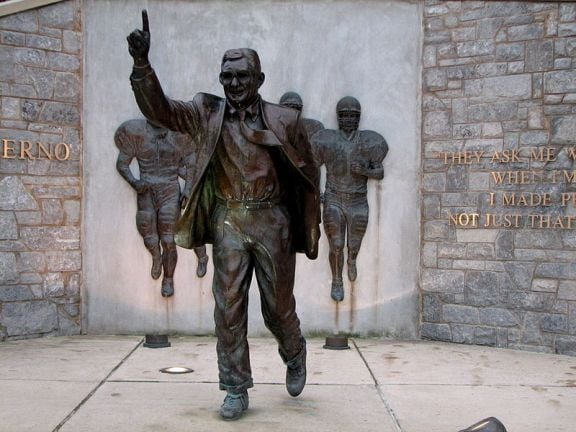Joe Paterno's transfer of homeownership to his wife in July most likely was not an attempt to shield assets before a sexual-abuse scandal hit Pennsylvania State University's football program. Instead, it was more likely to take advantage of expiring estate tax rules, lawyers said.
Mr. Paterno switched ownership of his ranch-style home in State College, Pa., from joint ownership with his wife, Susan, to her full ownership July 21 in a $1 transaction, documents filed in Centre County, Pa., show.
A New York Times story Nov. 15 suggested that the move could have been an effort to shield the home from future lawsuits that may arise from the child abuse scandal that was first revealed early this month.
But attorneys familiar with Pennsylvania law said the property already was protected from creditors because it was jointly owned and therefore could not be subject to creditors of only one of the spouses. The only way the house, valued at $594,484, could be exposed to creditors is if both Mr. and Mrs. Paterno were targeted in a lawsuit, lawyers said.
“I don't think it had anything to do with the situation at Penn State,” said Lancaster, Pa., estate attorney John May. “If the house had been in his name alone, then it would appear to be an effort to protect that asset.”
Putting the home in Susan Paterno's name likely was done to take advantage of the unified credit that applies to federal estate taxes, Mr. May said. Current law exempts $5 million per spouse from estate taxes, though that is set to fall to $1 million each in 2013.
Mrs. Paterno may have needed more assets to build up her estate to $5 million, Mr. May said. He said he has no knowledge of Mr. Paterno's estate-planning motivations and isn't involved in the PSU case.
RELATED ITEM Penn State the most-expensive state school in the U.S. »
Mr. Paterno, who was fired as the university's football coach Nov. 9 after 46 years, is not accused of anything illegal and is not a target of a police investigation, according to Pennsylvania's attorney general. The PSU board of trustees fired the 85-year-old coach as criticism flared that Mr. Paterno and other school leaders should have done more to stop alleged abuse by former assistant coach Jerry Sandusky.
Some have suggested Mr. Paterno could be targeted by civil actions.
Wick Soellers, Mr. Paterno's attorney, wrote in an e-mail that the transfer of the Paterno home “was wholly unrelated to the Sandusky matter and was a component of long-term estate planning.”
Mr. Soellers declined to describe the estate-planning specifics but said he concurs that the home was protected from creditors when it was jointly owned.
“Husband-and-wife ownership of assets is completely safe in the claims of creditors in Pennsylvania and in about one-third to half of all states,” said Jack Terrill, a West Conshohocken, Pa., estate-planning attorney.
When a husband and wife buy a property together in Pennsylvania, they are considered “tenants by the entireties,” meaning each spouse technically owns 100% of the property. Therefore, a creditor of one spouse can't take property that is held by both, lawyers said.
Mr. Terrill said the house transfer makes sense only as an estate-planning step, not as an asset protection move. He said he regularly recommends that wealthy couples shift assets to take advantage of the federal estate tax exemptions.
The current estate tax provisions are set to change Jan. 1, 2013, unless the president and Congress can agree on new terms. The estate tax is set to rise to 55% with a $1 million exemption, from 35% with a $5 million exemption.
University of Pittsburgh law professor Lawrence Frolik — who was quoted in a New York Times story saying he thought the house transfer sounded “like an attempt to avoid personal liability” — wrote in an e-mail that he had no comment for this story.







